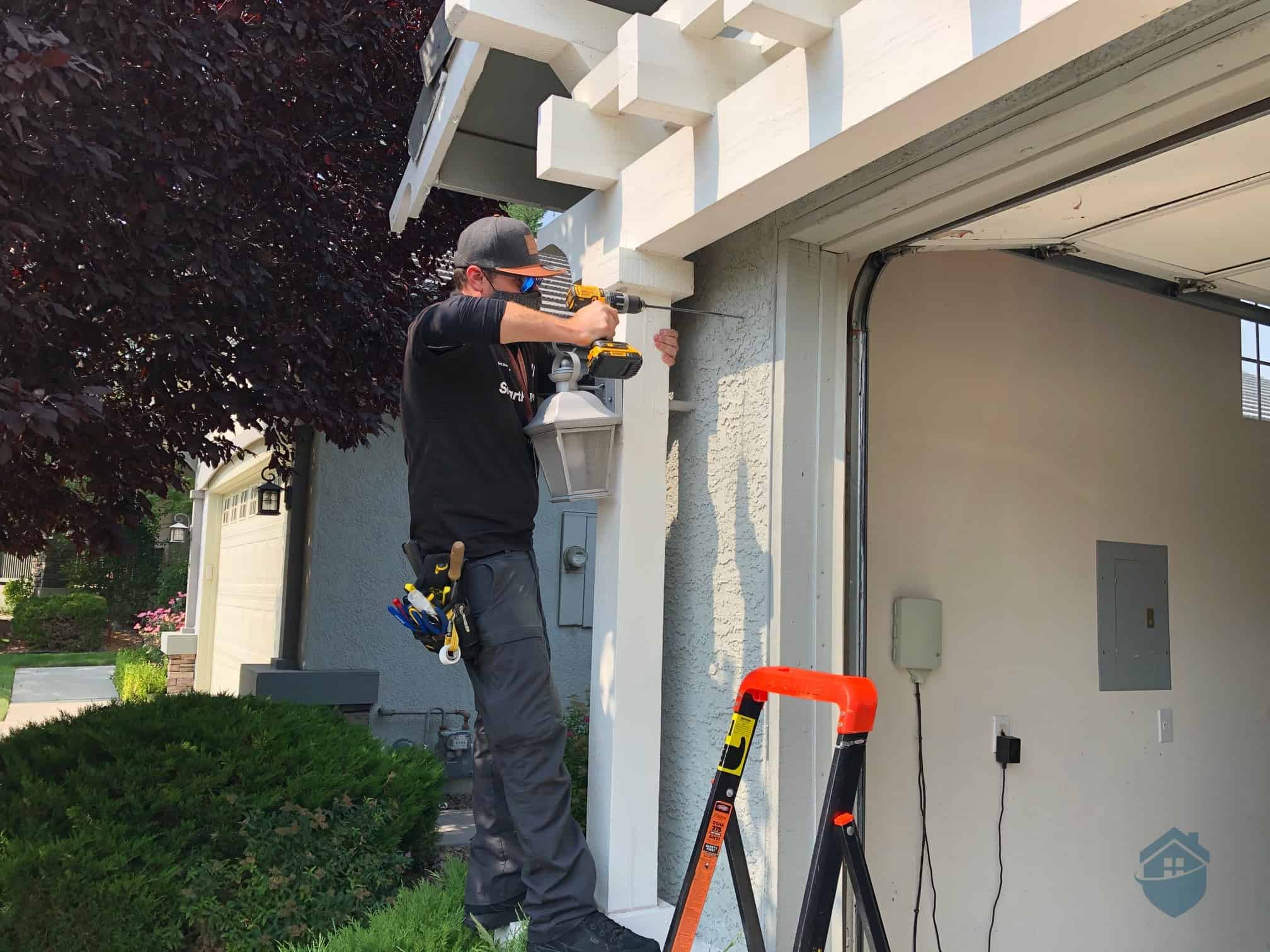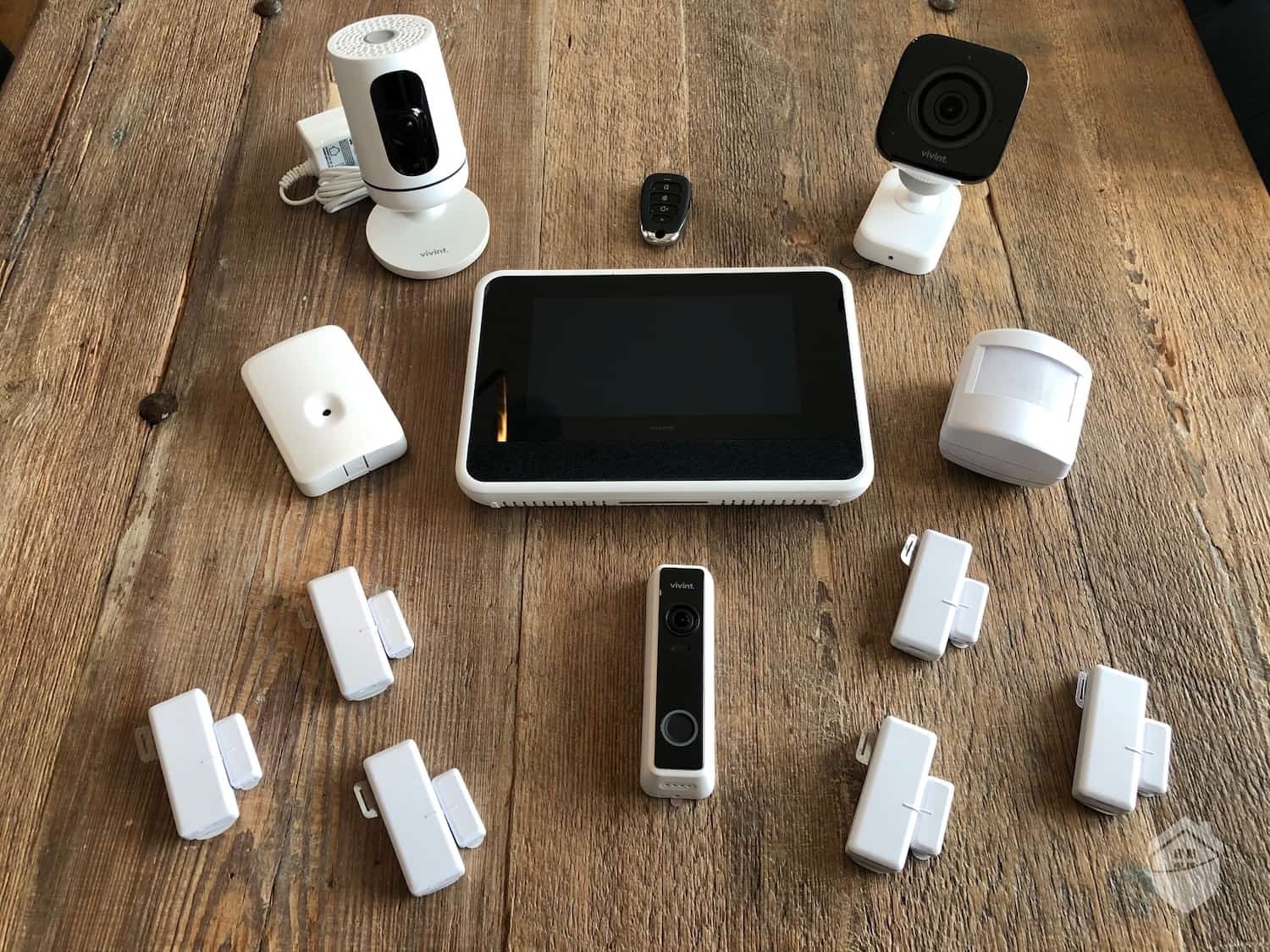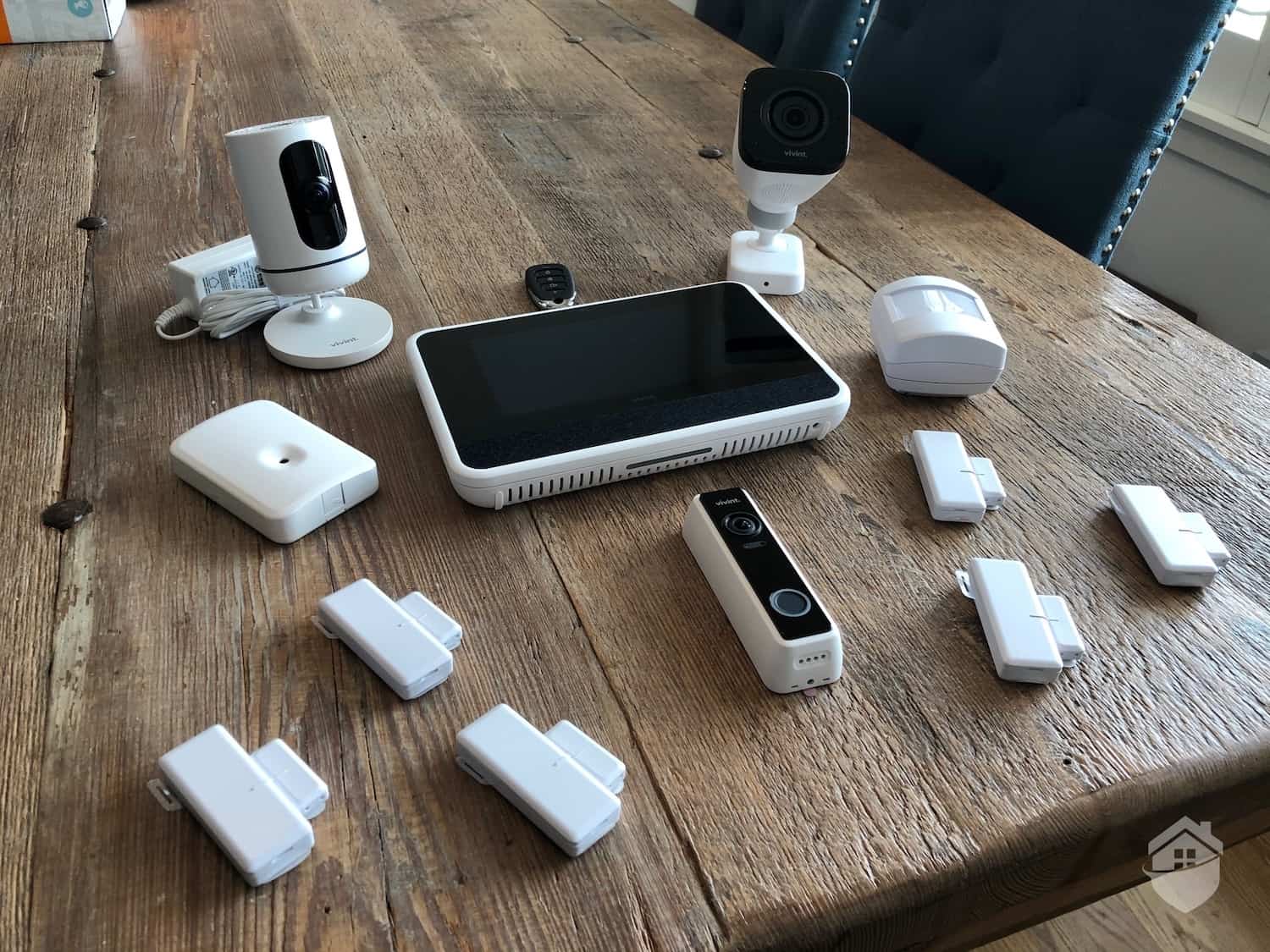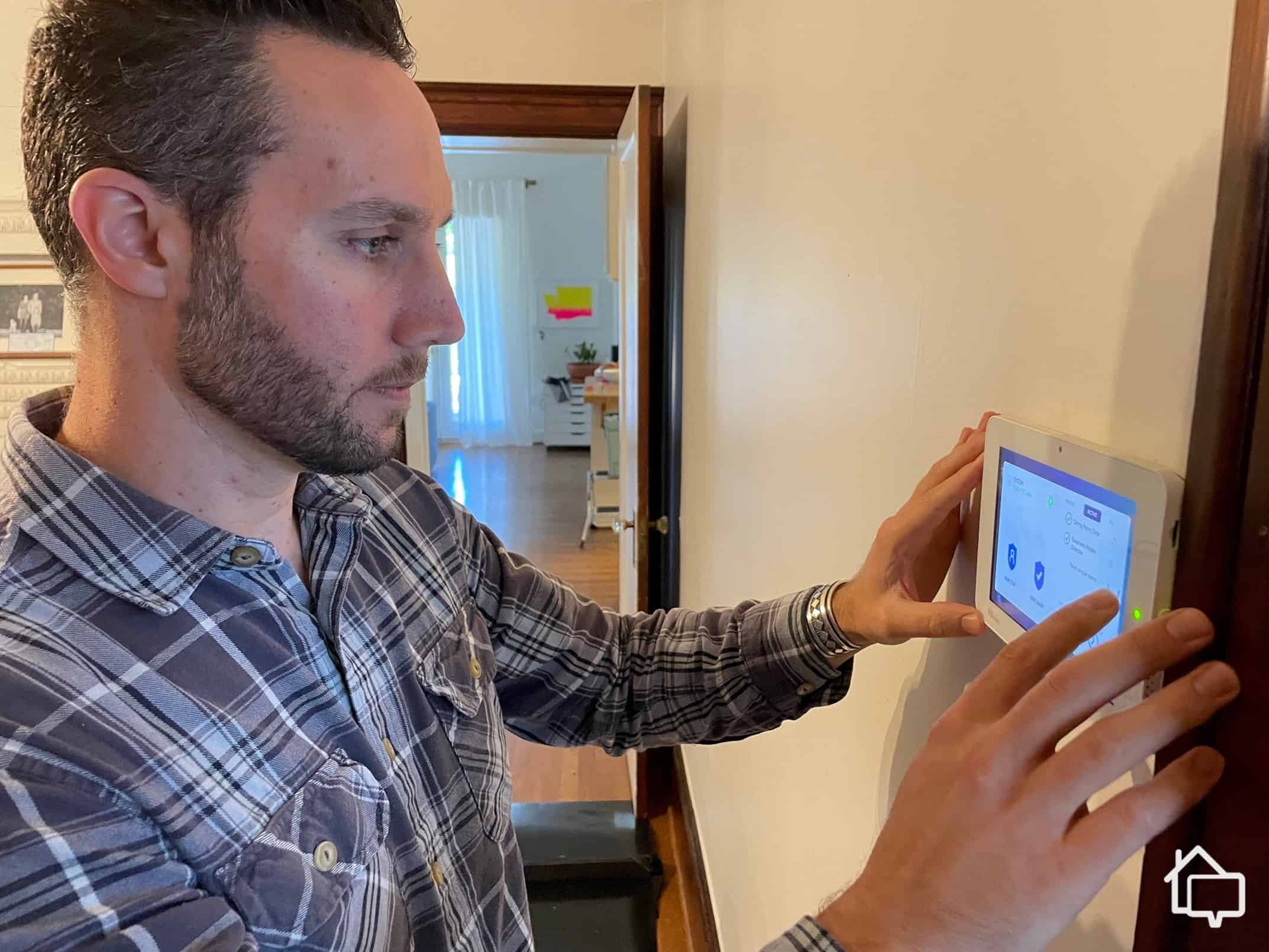Not all home security systems require contracts, but some of the best home security providers do, including Vivint. These contracts are mostly there for financing, like your typical car or phone plan contract. In fact, you can avoid the contract if you’re ready to pay for all of your equipment upfront.
That said, contracts are binding agreements, so it’s important to look at them closely before signing. That’s what we did when we financed the Vivint home security system we tested. Here are our main takeaways, including some important advice about cancellation policies.
>>Learn More: Installing a Vivint Home Security System

We're pretty handy, but we left our installation to the security experts at Vivint.
FYI: Vivint offers special exceptions to their contract for those serving in the U.S. armed forces. This may not apply to you, but it could come in handy if someone you know is on active duty.
Vivint Contracts at a Glance
Vivint’s contracts typically range from 42 to 60 months, or 3.5 to 5 years. The length depends on your equipment financing plan. If you’re looking to pay off your equipment in 42 months, you’ll sign a 42-month contract. If you want to pay it off in 60 months, you’ll sign a 60-month contract. This also means that, if you pay off your equipment up front, you’re not required to sign a contract.
That being said, most people (including us) find Vivint’s pricing to be on the upper end of home security pricing. A lot of Vivint users can only afford the equipment through financing, so they have to sign a contract. We had to as well when we tested Vivint. The contracts from Vivint tend to be a bit longer than the average ADT contract, which is three years (two in California).
>>Compare: Vivint vs ADT
Pro Tip: We discovered, after some digging, that Vivint does offer zero-interest financing in some cases. If you’re financing your Vivint equipment, definitely look into this option because it could save you money.
Vivint’s Fees
As we touched on above, if you’re in a position to purchase your Vivint equipment up front, your only monthly fee will be for monitoring. Just be forewarned: Vivint’s equipment is at the high end compared to other top home security names with monitoring plans we’ve tested, like SimpliSafe. SimpliSafe packages also come with both monitored and self-monitored options, by the way, which makes SimpliSafe a more affordable all-around option. Vivint not only offers but requires professional monitoring.
>>Check Out: The Best Home Security Systems for Homeowners on a Budget
Equipment Fees
As for equipment fees, Vivint now offers more accessible entry points with the HomeProtect system starting at $199, making professional smart home security available at a lower price point than ever before. However, this package does not support third-party integrations with Google, MyQ or PhilipsHue. For that, you’ll still need their HomeProtect Pro package which starts at $499. After customizing your system, expect to spend upwards of $1,000.
Of course, with a customized system, you'll have a much more secure home. You can include add-ons like Vivint's 2nd Gen 1664p HDR Doorbell Camera Pro and an outdoor security camera or two. Plus, Vivint does have smart home options.
>>Go Deeper: Vivint Window, Door, and Glass Sensors
FYI: Don’t confuse Vivint’s monthly equipment fee with their monthly monitoring fee. The first is required with financing, the second is required with every Vivint plan.
Monitoring Fees
Vivint's monitoring fees range from $24.99 to $49.99 per month. Keep in mind that Vivint may also charge monthly fees for additional cameras and video storage. In fact, if you have security cameras in your Vivint system, you’re required to sign up for the top-tier monitoring plan. That usually goes for around $50 per month, which is similar to ADT and Frontpoint’s monitoring prices. And remember, you have to keep paying the monthly monitoring fee as long as you’re under contract. Canceling early could result in penalties. (More on that next.)
>>Go Deeper: Protect Your Home Security Camera from Hackers

We built our Vivint package out for maximum security with indoor and outdoor cameras, plus a Doorbell Camera Pro.
Vivint’s Cancellation Policy
One of the first things we look at when signing on the dotted line is the cancellation policy. To cancel your Vivint contract, you’ll need to email a Notice of Cancellation to the company. (You can also snail mail or fax it.)
Be sure to notify Vivint at least 30 days before your cancellation date. Include the following info in your cancellation notice:
- The date of the cancellation letter
- Your Vivint service number
- Your intent to cancel your contract
- A brief explanation of why you wish to cancel
- Your signature
All in all, not so bad. Of course, you’re still liable for your remaining equipment balance (if you have one) when you cancel. There’s also an early cancellation fee of $300 if you cancel during the first year; it’s $150 after that. If that sounds unfair, stay with us, because there are ways around this.
>>Learn More: Canceling Your Home Security Contract
How to Cancel A Vivint Contract Without Penalty
There are some possible loopholes we discovered for getting Vivint to waive the early cancellation fee. Just note that approval isn’t automatic. Vivint’s Exceptions Review Team has to review your request first, which they do on a case-by-case basis.
Right of rescission: According to our Vivint contract, we had three days to cancel our service without penalty. A grace period like this isn’t unusual. In fact, many security companies offer a 30-day (or longer) money-back guarantee. For example, ADT offers a six-month guarantee. So, we weren’t thrilled with Vivint’s three-day return policy. However, if you do return your equipment within this period, Vivint should waive your cancellation fee.
Did You Know? The Right of Rescission isn’t exactly a return policy. The law requires that companies give consumers three days to return a product, service, or loan without penalty. This is commonly known as the “buyer’s remorse law.”
Bankruptcy: If you declare bankruptcy, Vivint will also waive your cancellation fee. Just be sure to keep all of your bankruptcy records handy and ready to share with the Exceptions Review Team.
Move to a retirement home: You can also cancel your Vivint contract penalty-free if you move into an assisted living or retirement home. We actually like that Vivint put this clause into their contract, as the decision to move into a retirement home is often out of our hands.
>>Read More: Our Favorite Home Security Systems for Seniors
Military deployment: If you’re on active duty or are reserve military and you’re about to be deployed for six or more months, Vivint won’t ask you to pay a cancellation fee. This is also true if you receive PCS orders, if you’re medically discharged, or have been retired for at least 20 years. Just have your papers in order before you contact Vivint.
Qualified candidate takeover: If a friend or family member takes over your Vivint agreement, you won’t be liable for any fees going forward, including early cancellation fees.
Death: This isn’t a way for us to save money, obviously. It’s a way to help our families, who can request to waive Vivint’s cancellation fee in the event of our deaths.
FYI: Vivint’s “Military Moves” program allows active service members to move their security system without any relocation, reinstallation, or reactivation fees. If you’re on active duty and temporarily transferred away from home, you can also defer payment for up to one year.
What Happens to My Contract If I Move?
Moving across town—or even across the country—doesn’t cancel your Vivint contract, which is reassuring. You won’t lose service, and Vivint makes relocating easier with a dedicated team of Move Specialists to help current customers transition smoothly. However, this costs a fee starting at $149.
When you move with Vivint, you can:
- Build a new Vivint system from the ground-up
- Take down your existing Vivint system yourself and have Vivint reinstall it
- Have Vivint technicians take down and reinstall your system for you
Pro Tip: We know Vivint’s installation is top-notch because our technician offered to repatch our walls for us if we ever moved!
It’s worth mentioning that Vivint doesn’t offer service out of the country. But, if you’re moving locally or to another state, reach out to Vivint two weeks before you move. They’ll need to schedule a professional installation for your new home.
>>Check Out: Moving Your ADT Security System

Our Vivint technician told us he would personally fill our drill holes if we ever moved.
Vivint Warranty and Service Plans
Vivint’s 120-day (four-month) warranty is short compared to industry norms—SimpliSafe offers one year, and Frontpoint covers equipment for three years.
That doesn’t leave you stranded if something breaks after four months. Vivint provides after-sales service, but you’ll pay for the visit. Each service call does include a 60-day guarantee, which is a small comfort.
Another option is Vivint’s Protect plan for $10 per month. We chose this since we’d already invested $1,000 in the system, and $10 extra for coverage during the first year felt reasonable. Still, a longer standard warranty would be a smarter approach.
Billing Options
Like most companies these days, Vivint prefers paperless billing and autowithdrawal. You can set up both online.
If you prefer physical notices, Vivint will bill you the old-fashioned way through the mail. You can also pay manually online each month.
FYI: We went with paperless, automatic bill payments. We still got to see our bills. It was just one less thing we had to worry about at the end of the month.
Installation and Activation Fees
Vivint typically charges between $99 and $199 for installation. This is fairly standard for professionally installed home security systems. ADT charges similar fees.
However, Vivint’s installation and activation fees aren’t written in stone. In fact, the company frequently runs deals and promotions that waive both, so be on the lookout for those.
Bottom Line
Ultimately, Vivint’s financing works much like an iPhone plan. With decent credit, you can spread equipment costs over several years through a payment agreement.
Alternatively, you can pay for equipment upfront and only cover the monthly monitoring fee, typically ranging from $24.99 to $49.99 depending on your plan, equipment and features.
Your choice depends on your budget and how much gear you need. After hundreds of hours of testing Vivint, we can say confidently: plan or no plan, Vivint delivers some of the best home security equipment available today.
FAQs
- Do Vivint plans require contracts?
If you pay up front, you don’t have to sign a contract. If you’re financing your equipment, you do.
- Do I have to pay a fee if I cancel my Vivint contract?
Yes, unless you cancel within three days. After that, you’ll be liable for the full cost of the contract as well as an additional cancellation fee ranging from $150 to $300.
- How long is my Vivint warranty good for?
Vivint’s warranty protects your equipment for 120 days (four months).
- What happens to my Vivint system if I move?
You can either take your equipment down yourself or have Vivint do it for you. You’ll need to schedule a reinstallation in your new home.
- Does Vivint charge an installation fee?
Yes, Vivint does charge installation and activation fees. But, you may be able to waive these if you find a promotion.







